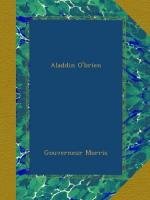It came one morning thumb-marked about the sealing, and covered with the generous sprawl of her writing. It said:
Dear Aladdin: Do not say anything about this because I do not know if my father would like it but I am so sorry about your father blowing up and all your troubles and I want you to know how sory I am. I must stop now because I have to practis.
Your loving friend
Margaretst. John.
Aladdin was an exquisite speller, and the first thing he noticed about the letter was that it contained two words spelled wrong, and that he loved Margaret the better by two misspelled words, and that he had a lump in his throat.
He had found the letter by his plate at breakfast, and the eyes of Mrs. Brackett fastened upon it.
“I don’t know who ken have been writin’ to you,” she said.
“Neither do I,” said Aladdin, giving, as is proper, the direct lie to the remark inquisitive. He had put the letter in his pocket.
“Why don’t you open it and see?”
Aladdin blushed.
“Time enough after breakfast,” he said.
There was a silence.
“Jack’s eatin’ his breakfast; why ain’t you eatin’ yours?”
Aladdin fell upon his breakfast for the sake of peace. And Mrs. Brackett said no more. Some days later, for she was not to be denied in little matters or great, Mrs. Brackett found where Aladdin had hidden the letter, took it up, read it, sniffed, and put it back, with the remark that she never “see such carryin’s-on.”
Aladdin hid, and read his letter over and over; then an ominous silence having informed him that Mrs. Brackett had gone abroad, he stole into the parlor, perched on the piano-stool, and, like a second Columbus, began to discover things which other people have to be shown. The joy of his soul had to find expression, as often afterward the sorrow of it.
That winter Jack entered school in the lowest class, and the two little boys were to be seen going or coming in close comradeship, fair weather or foul. The yellow cat had affairs of gallantry, and bore to the family, at about Christmas-time, five yellow kittens, which nobody had the heart to drown, and about whose necks, at the age of eye-opening, the Widow Brackett tied little white ribbons in large bows.
Sometimes Aladdin saw Margaret, but only for a little.
So the years passed, and Aladdin turned his sixteenth year. He was very tall and very thin, energetic but not strong, very clever, but with less application than an uncoerced camel. To single him from other boys, he was full of music and visions. And rhymes were beginning to ring in his head.
A week came when the rhymes and the music went clean out of his head, which became as heavy as a scuttle full of coal, and he walked about heavily like an old man.




